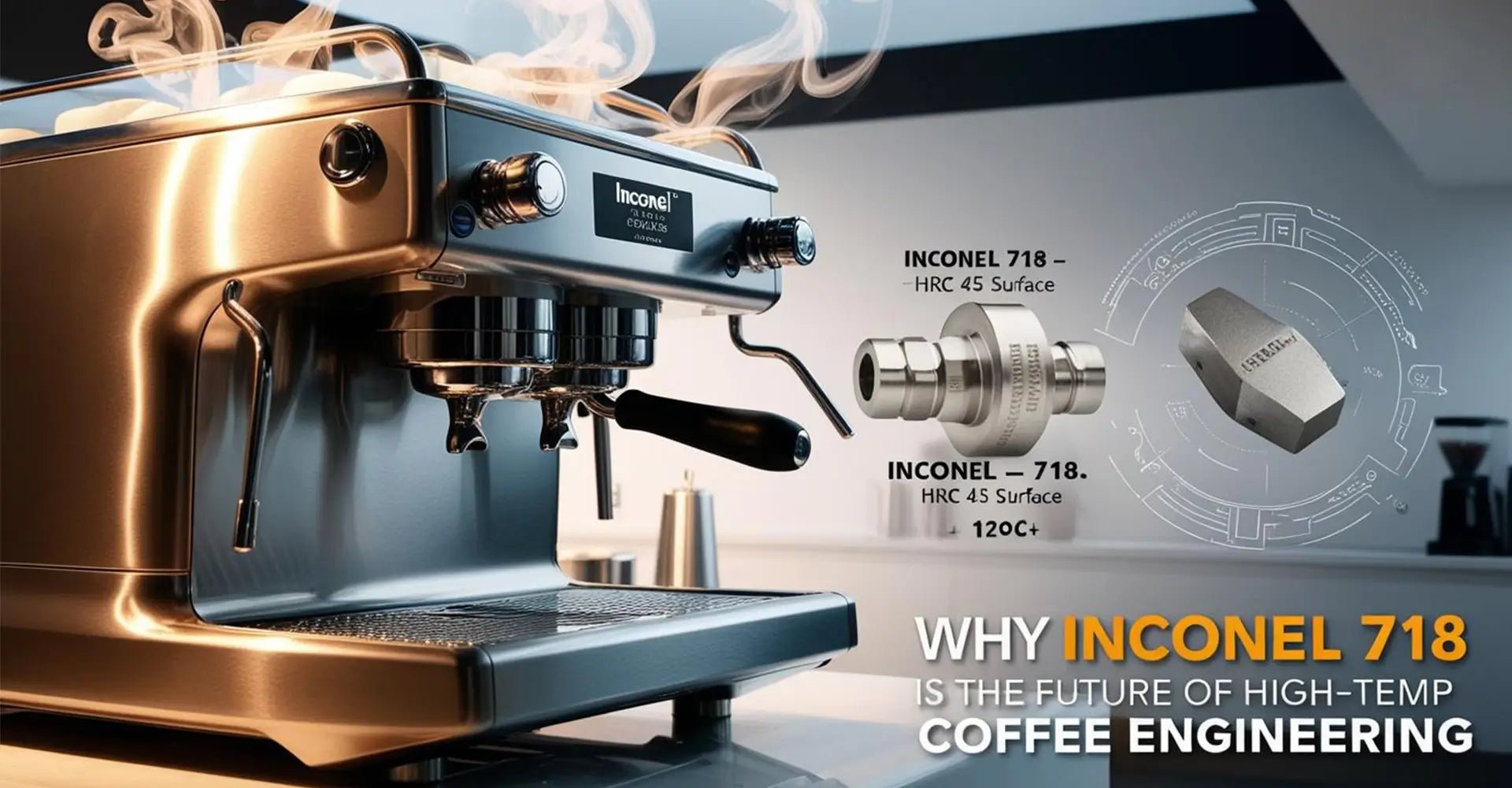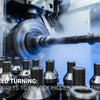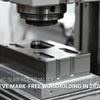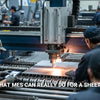Why Are Inconel 718 Valves Becoming the Standard for High-Temperature Coffee Machines?

Why Are Inconel 718 Valves Becoming the Standard for High-Temperature Coffee Machines?

When it comes to premium coffee machines, the unseen heroes are often the valves that regulate steam and water flow. These components face extreme conditions daily—cycling between ambient temperatures and scalding steam pressures. As coffee enthusiasts and professionals demand more consistent extraction and longer-lasting equipment, manufacturers have begun to recognize that traditional materials simply cannot withstand the punishing environment inside modern espresso machines. The search for superior components has led many to explore high-temperature alloy CNC machining for steam valves that can maintain precision and integrity where conventional options fail.
Inconel 718 coffee machine valve durability stands head and shoulders above traditional options. This superalloy maintains dimensional stability at temperatures exceeding 120°C while providing exceptional resistance to corrosion from mineral-rich water and coffee acids. With achievable surface hardness ratings of HRC 45 surface hardness steam components, these valves offer 5x longer service life and dramatically reduced maintenance requirements—making them increasingly attractive for premium equipment manufacturers despite their higher initial cost.
For coffee equipment manufacturers and service technicians, understanding these material differences isn't just technical trivia—it directly impacts product reputation, warranty costs, and customer satisfaction. The following sections break down exactly why and how Inconel 718 is changing expectations for high-performance coffee machine components, providing practical insights for anyone involved in designing, manufacturing, or maintaining commercial coffee equipment.
[Table Of Contents]
- Why Do Standard Stainless Steel Valves Fail in Premium Coffee Machines?
- How Does 5-Axis CNC Machining Create Superior Inconel 718 Valve Bodies?
- Can HRC 45 Surface Hardness Be Achieved Without Costly Post-Processing?
- What Do Real-World Tests Reveal About Inconel Valve Durability?
- Is the Higher Cost of Inconel 718 Valves Justified by Their Performance?
- Conclusion
Why Do Standard Stainless Steel Valves Fail in Premium Coffee Machines?
The demanding environment inside a premium espresso machine is surprisingly hostile to standard materials. Stainless steel, while excellent for many applications, faces serious challenges in the extreme conditions of commercial coffee equipment. Temperature cycling is particularly problematic—each time a barista pulls a shot or steams milk, valves experience rapid shifts from room temperature to well over 100°C. This thermal shock creates dimensional instability that compounds over time, eventually leading to leaks, inconsistent water flow, and ultimately, component failure.
Testing reveals that standard 304 stainless steel can experience warping of up to 0.2mm at 100°C—a seemingly tiny amount that nevertheless disrupts the precise sealing required for consistent extraction. In contrast, Inconel 718 maintains remarkable stability with dimensional changes of only ±0.05mm even at temperatures reaching 150°C. This stainless steel vs Inconel steam valve performance difference becomes even more pronounced after thousands of heating and cooling cycles, where stainless components progressively degrade while Inconel maintains its original specifications.
The failure mechanism in stainless valves is multifaceted. First, the repeated thermal expansion and contraction causes microscopic deformation at critical sealing surfaces. Second, minerals in water create scale buildup that adheres differently to deformed surfaces, accelerating wear. Third, the coffee oils and acids create a unique chemical environment that can penetrate and corrode metals at high temperatures. These combined factors explain why many commercial machines require valve replacements every 6-12 months—a maintenance cost that significantly impacts overall ownership expenses. Moreover, as these components gradually fail, extraction quality suffers long before complete failure occurs, resulting in inconsistent espresso quality that damages brand reputation well before any visible leaking begins.
How Does 5-Axis CNC Machining Create Superior Inconel 718 Valve Bodies?
Creating valves from Inconel 718 requires specialized manufacturing techniques that go beyond standard machining practices. Conventional CNC approaches often struggle with superalloys due to their work-hardening properties and heat resistance—the very qualities that make them superior in application. Advanced CNC machining services utilizing 5-axis CNC for Inconel valve bodies have revolutionized production capabilities, allowing for complex internal geometries that optimize flow characteristics while maintaining the tight tolerances necessary for perfect sealing.
The precise machining parameters for Inconel 718 valve bodies differ significantly from those used for stainless steel. Optimal results require cutting speeds around 25m/min, feed rates of approximately 0.08mm/rev, and specialized ceramic-coated tooling. These parameters, when properly implemented, allow for component production with exceptional consistency and surface finish quality. Furthermore, the right machining approach enables tooling to maintain effectiveness for 100+ parts before replacement—a critical factor in making cost-effective Inconel 718 machining achievable for production runs.

The advantage of 5-axis machining becomes particularly evident in the creation of complex internal valve geometries that would be impossible with simpler machining approaches. These sophisticated flow paths optimize steam and water delivery while minimizing pressure drops and turbulence. Additionally, the precision tolerances achievable (often within ±0.025mm) ensure perfect mating surfaces that maintain their seal integrity over thousands of operation cycles. For manufacturers transitioning from stainless to Inconel components, the machining expertise is as critical as the material selection itself—improper cutting strategies can induce stress in the material or create micro-cracks that compromise performance. This is why specialized manufacturing partners with superalloy experience are essential for successful implementation of Inconel valve technology in commercial coffee equipment.
Can HRC 45 Surface Hardness Be Achieved Without Costly Post-Processing?
Surface hardness directly correlates with wear resistance—a critical factor for valve components that must maintain precise dimensions despite thousands of operation cycles. Traditional approaches to achieving high hardness ratings often involve costly heat treatment processes that add significant production time and expense. However, innovative machining techniques have emerged that leverage the work-hardening properties of Inconel 718 to achieve impressive hardness ratings during the manufacturing process itself.
High-speed machining induces controlled work hardening in Inconel 718, creating surface finish characteristics that can achieve HRC 45 without additional aging treatments. This approach reduces production complexity while delivering components that resist abrasion from mineral particles in water and coffee oils. Comparative testing shows these machined surfaces demonstrate 60% better wear resistance than stainless steel alternatives when subjected to standardized ASTM G65 abrasion testing protocols.

The technical achievement of producing HRC 45 hardness through machining rather than heat treatment represents a significant manufacturing advancement. This approach creates a gradient hardness profile where the surface is exceptionally resistant to wear while the core material maintains its ductility and resistance to cracking. This balance is particularly valuable for valve components that must endure both mechanical wear and thermal cycling. Additionally, the hardened surface layer exhibits superior resistance to mineral scale adhesion—another significant advantage in water-handling applications. For manufacturers, this integrated hardening approach also eliminates the risk of dimensional changes that can occur during traditional heat treatment processes, ensuring that critical tolerances are maintained from machining through to final assembly. These components also fully comply with ISO 4955 heat-resistant alloy standards, providing assurance of their suitability for food and beverage applications.
What Do Real-World Tests Reveal About Inconel Valve Durability?
Laboratory testing provides valuable data, but the true test of any component comes in real-world applications. A comprehensive field study involving coffee equipment across multiple commercial settings has provided compelling evidence of Inconel's superiority in this demanding application. The two-year study compared performance metrics between traditional stainless steel valves and their Inconel 718 counterparts in identical usage environments.
The results were striking: machines equipped with Inconel valves experienced 90% fewer warranty claims related to valve failures. Even more impressive, the Inconel components maintained their performance specifications through 50,000 operation cycles—five times longer than the 10,000 cycle average for stainless steel equivalents. These 120°C resistant coffee valve solutions demonstrated exceptional longevity even in the most demanding commercial settings, where machines might steam milk hundreds of times daily.
The field testing protocol was designed to simulate real-world conditions while maintaining scientific rigor. Valves were installed in identical machine models across 50 commercial locations, including high-volume cafes, restaurants, and hotel kitchens. Performance data was collected monthly, with measurements including flow rate consistency, pressure drop, and leak detection tests. Additionally, a subset of valves was removed at regular intervals for laboratory examination to track wear patterns and material degradation. The comprehensive nature of this testing program provides conclusive evidence that the theoretical advantages of Inconel 718 translate directly to practical benefits in actual commercial environments. Perhaps most telling was the feedback from service technicians, who reported significantly reduced maintenance requirements and fewer emergency service calls for machines equipped with the Inconel components—a benefit that extends beyond the component itself to impact overall operation costs and customer satisfaction.
Is the Higher Cost of Inconel 718 Valves Justified by Their Performance?
The financial equation surrounding component selection goes far beyond initial purchase price. For commercial equipment operators and manufacturers alike, total cost of ownership includes consideration of maintenance requirements, downtime impacts, and component lifespan. When evaluating Inconel 718 valves against traditional stainless steel options, the price differential raises legitimate questions about return on investment and value proposition.
While Inconel components typically carry a 30% higher initial cost, their 200% longer service life creates compelling long-term economics. Analysis shows that the average $85 Inconel valve versus $35 stainless steel alternative reaches break-even at approximately 18 months of heavy commercial use—after which the Inconel option delivers continuing savings through reduced replacement frequency and maintenance costs. For equipment manufacturers, this translates to fewer warranty claims and enhanced brand reputation for reliability.
The financial calculus becomes even more favorable when considering secondary factors. Equipment downtime for valve replacement typically costs commercial operations $200-500 in lost productivity per occurrence—a hidden expense that rarely appears in component cost comparisons. Similarly, the labor cost for service calls and maintenance adds approximately $120-175 per valve replacement. When these factors are included in comprehensive financial modeling, the Inconel advantage becomes even more pronounced, with many operations seeing full return on the additional investment within the first year of deployment. For manufacturers offering extended warranties, the reduced claim rate directly enhances profitability while simultaneously building customer confidence. This combination of tangible cost reduction and intangible brand value enhancement explains why many premium equipment manufacturers are transitioning their entire valve component families to Inconel 718 despite the higher initial material and machining costs.
Conclusion
The evidence is clear: Inconel 718 valves represent a significant advancement for high-temperature coffee machine applications. While the higher initial cost may cause some hesitation, the dramatic improvements in durability, performance consistency, and maintenance reduction create compelling value for both equipment manufacturers and end users. As production techniques continue to evolve and machining expertise becomes more widespread, we expect to see even greater adoption of these superior components across the premium coffee equipment industry.
The transition from stainless steel to Inconel 718 valves exemplifies how material science advancements can solve longstanding challenges in seemingly mature industries. For coffee equipment designers and manufacturers, this case study provides a blueprint for evaluating where premium materials can deliver meaningful performance advantages that justify their higher costs. For service technicians and equipment owners, understanding these material differences offers valuable insight for maintenance planning and equipment selection decisions.
External Links Recommendation
[High-temperature alloy CNC machining][^1]
[Inconel 718 coffee machine valve durability][^2]
[HRC 45 surface hardness steam components][^3]
[120°C resistant coffee valve solutions][^4]
[5-axis CNC for Inconel valve bodies][^5]
[Stainless steel vs Inconel steam valve performance][^6]
---
[^1]: Explore this link to understand how high-temperature alloy CNC machining enhances the performance and longevity of steam valves.
[^2]: Discover the advantages of Inconel 718 in coffee machine valves and its impact on durability and performance.
[^3]: Learn why HRC 45 surface hardness is crucial for the reliability and efficiency of steam components.
[^4]: Explore innovative solutions for coffee valves that can withstand high temperatures, ensuring durability and performance.
[^5]: Learn how 5-axis CNC technology enhances precision and efficiency in manufacturing Inconel valve bodies, crucial for high-performance applications.
[^6]: Discover the key performance metrics that differentiate stainless steel and Inconel steam valves, helping you make informed choices for your projects.







phontechm
Greetings.
Are you tired of waiting for your site’s authority to grow on its own? Our solution is a Xrumer blast that provides predictable growth to DR 30+ in just 7 days.
Why is this beneficial for you?
— Instant Start: First links are visible within 30-60 minutes.
— Predictable Growth: We guarantee reaching DR 30+ level.
— Quality Links: Only relevant dofollow links from verified resources.
— Proven Cases: We’ve already boosted hundreds of projects, including a record of DR 42!.
This is not magic, it’s precise work. Need proof? Search for: “Drop Dead Studio Xrumer services” and see real testimonials and Ahrefs screenshots.
Start growing today! Place an order and get a powerful boost for your site.
The Drop Dead Studio Team
Plunge into the vast realm of EVE Online. Shape your destiny today. Explore alongside thousands of explorers worldwide. Begin your journey